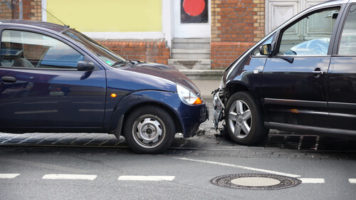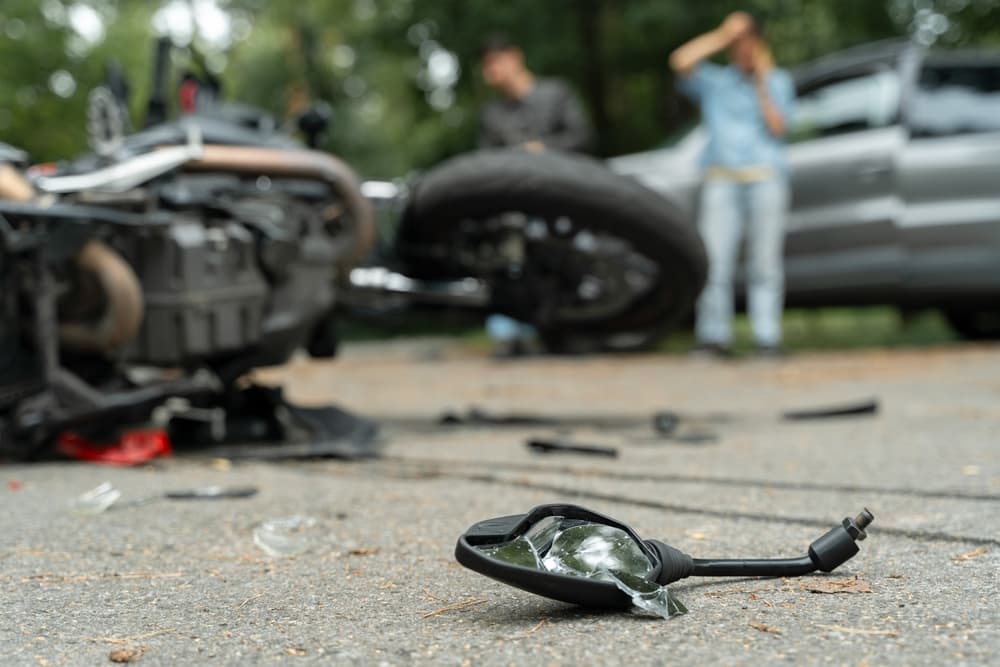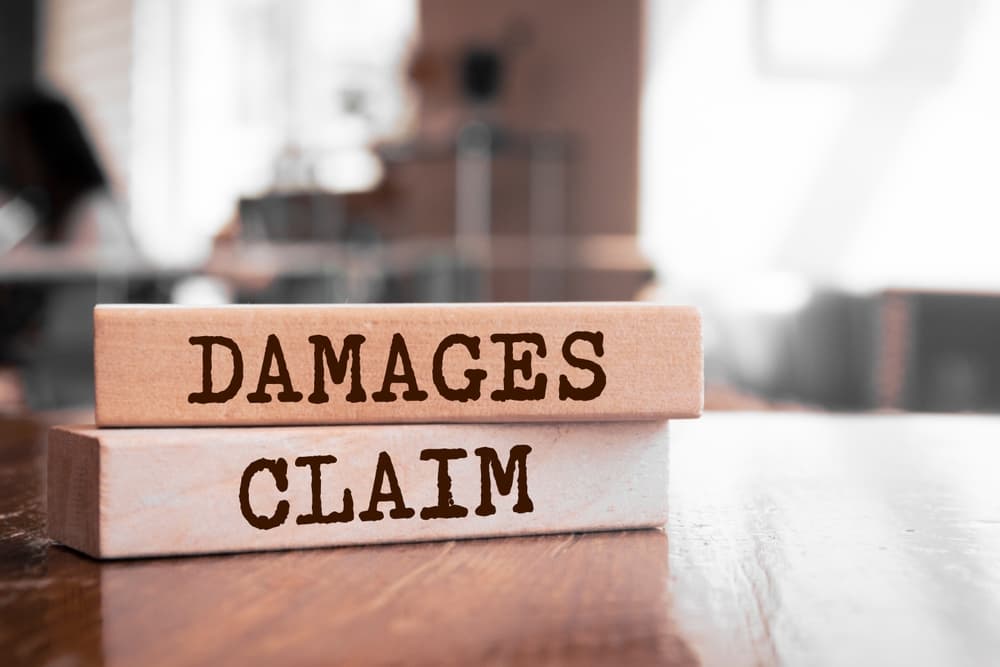A motorcycle crash often leaves riders with serious injuries and heavy financial strain. Some riders in Missouri also face the loss of their bike, which can feel just as personal as the accident itself. When the insurance company decides that the motorcycle cannot be repaired for a reasonable cost, they may declare it a total loss. You’re probably wondering what happens when the insurance company totals your motorcycle? The process involves several steps, each with legal and financial consequences that affect your recovery.
Many riders don’t realize they can challenge an insurance company’s decision or settlement offer. Having legal support helps ensure you don’t accept less than what your claim is worth. A Missouri motorcycle accident lawyer can evaluate your situation, explain your options, and stand up to insurers that undervalue your bike or delay the process.
Key Takeaways About Motorcycle Accidents in Missouri
- Understanding Missouri’s total loss threshold and how insurers calculate your motorcycle’s actual cash value
- Knowing your rights to dispute an insurance company’s total loss determination and settlement offer
- Recognizing when gap insurance and replacement cost coverage can protect you from financial losses
- Learning how Missouri’s comparative fault laws may affect your total loss settlement
- Understanding the timeline and process for resolving total loss claims in Missouri
What Does It Mean When Your Motorcycle Is “Totaled”?
When an insurance company calls your motorcycle a total loss, it means the cost to repair it exceeds a percentage of its pre-crash value or the repairs would be unsafe. Each state sets standards, and Missouri follows specific guidelines.
Missouri’s Total Loss Threshold Standards
Missouri law requires insurers to declare a vehicle a total loss when repair costs exceed 80 percent of its actual cash value. This is called the total loss threshold. For example, if your bike’s actual cash value is $10,000, and repairs would cost $8,200, the insurer must consider it totaled.
Some states use different thresholds. For instance, Kansas sets the threshold at 75 percent, while Illinois uses a much lower threshold of 33 percent. In other states like Texas, insurers can use their own formula if the law doesn’t specify a percentage. Missouri’s 80 percent rule makes it harder for insurers to avoid labeling a vehicle totaled, which can benefit policyholders by forcing a decision earlier.
How Insurance Companies Calculate Actual Cash Value
Actual cash value (ACV) refers to what your motorcycle was worth right before the crash, not what you paid for it originally. Insurers look at several factors, including:
- Market value: Comparable sales of similar motorcycles in your area
- Condition: Mileage, wear, and how well you maintained the bike
- Age: Older models usually carry lower ACV even if in great shape
While Missouri law requires insurers to calculate ACV fairly, disputes often arise when riders believe their bike was worth more than the insurer’s figure. In some states, riders can demand binding arbitration over ACV disputes, but Missouri typically uses the appraisal process.
The Difference Between Total Loss and Constructive Total Loss
Sometimes, insurers call a bike a constructive total loss when repairs might cost slightly less than the ACV, but still so close that it doesn’t make sense to fix it. In both cases, the result is the same: the insurance company treats the motorcycle as totaled.
How Do Insurance Companies Determine if Your Motorcycle Is a Total Loss?
Insurers don’t just look at the damage; they use formulas and state requirements to decide whether your bike qualifies as totaled.
The Cost-to-Repair vs. Value Analysis
They compare the repair estimate to the ACV. If repairs meet or exceed Missouri’s threshold, the bike becomes a total loss.
Independent Appraisal Requirements in Missouri
If you dispute the value, Missouri law allows an independent appraisal. Both you and the insurance company may hire appraisers. If they disagree, an umpire can step in to make the final decision.
Missouri leaves the arbitration process to private appraisers and umpires. That makes it even more important to collect strong evidence of your motorcycle’s condition.
Factors That Influence Total Loss Decisions
- Parts availability: Rare or discontinued parts raise repair costs
- Frame damage: Structural issues often lead to a total loss decision
- Labor rates: Higher shop rates increase repair totals
- Pre-accident condition: A pristine bike with upgrades may have higher value
What Happens to Your Motorcycle After It’s Declared Totaled?
Once your bike is labeled a total loss, ownership and settlement questions come into play.
Salvage Title Process in Missouri
If the insurer pays you for the ACV, the bike receives a salvage title. That title means the motorcycle was declared a total loss. If repaired, it must pass inspection before returning to the road with a rebuilt title.
In some states, like Illinois, the threshold for issuing a salvage title is lower, so bikes get branded as salvage more often. Missouri’s rules create fewer salvage titles but still require strict inspections for safety.
Your Options for Keeping the Totaled Motorcycle
You may keep the motorcycle by taking a lower payout equal to the ACV minus its salvage value. This allows you to rebuild the bike or use it for parts.
How Salvage Value Affects Your Settlement
Salvage value is the amount a buyer would pay for the totaled motorcycle. The insurer subtracts this figure from your motorcycle accident payout if you keep the bike. Riders often underestimate this impact. For example, if your motorcycle’s ACV is $9,000 and the salvage value is $2,000, you’d receive $7,000 instead of the full $9,000.
Can You Dispute an Insurance Company’s Total Loss Decision?
Riders often disagree with insurers about value. Missouri law gives you the right to push back.
Grounds for Challenging a Total Loss Determination
You can dispute when:
- The ACV calculation ignores upgrades or custom parts
- The insurer undervalues comparable motorcycles in your area
- The repair estimate seems inflated
Missouri’s Appraisal Process for Disputed Values
Each side hires an appraiser. If they don’t agree, an impartial umpire reviews both reports and decides.
Steps to Contest Your Settlement Offer
- Gather receipts for custom parts or recent repairs
- Research comparable sales in your area
- Submit documentation to the insurer
- Request independent appraisal if the insurer refuses to reconsider
What Compensation Are You Entitled to When Your Motorcycle Is Totaled?
Settlement payouts go beyond the motorcycle’s value.
Actual Cash Value vs. Replacement Cost Coverage
- ACV: Pays what your bike was worth before the crash, minus depreciation
- Replacement cost coverage: Pays enough to buy a new motorcycle of the same make and model, if your policy includes this
Additional Expenses You Can Claim
- Towing and storage fees: Costs to move and hold your bike after the crash
- Rental vehicle costs: Reimbursement for transportation while waiting on settlement
- Custom equipment: Coverage for upgrades like saddlebags or aftermarket exhaust, if included in your policy
Missouri Sales Tax and Registration Fee Recovery
Missouri requires insurers to cover sales tax, title, and registration fees on replacement motorcycles, so you don’t bear those costs out of pocket. Other states don’t always include this requirement, so Missouri riders may recover more than riders elsewhere.
How Does Fault Affect Your Total Loss Settlement?
Who caused the crash directly impacts your payout.
Missouri’s Pure Comparative Fault System
Missouri follows pure comparative fault, meaning each party’s compensation is reduced by their percentage of fault.
Impact on Total Loss Settlements
If you’re found 20 percent at fault, your settlement decreases by that amount. For instance, a $10,000 payout becomes $8,000.
Protecting Your Rights When Partially at Fault
Disputing fault assignments protects your settlement. Evidence such as police reports, witness statements, and crash reconstruction can help reduce your percentage of fault.
What If You Still Owe Money on Your Totaled Motorcycle?
Many riders still make loan payments on motorcycles when crashes happen.
Understanding Loan Payoffs and Negative Equity
If your settlement is less than the balance on your loan, you’ll still owe the difference. This is called negative equity.
Gap Insurance Coverage in Missouri
Gap insurance pays the difference between your settlement and loan balance. Without it, you remain responsible for any leftover debt. In Missouri, lenders often encourage riders to buy gap coverage because motorcycles depreciate faster than cars. Some states regulate gap coverage more closely, but in Missouri, it’s usually optional unless your lender requires it.
Options When You’re Upside Down on Your Loan
- Negotiate with the lender: Ask for a repayment plan for the remaining balance
- Use gap coverage: Eliminate negative equity if you purchased it
- Consider settlement funds: Apply all insurance money toward the loan
Common Mistakes to Avoid After Your Motorcycle Is Totaled
Knowing what not to do can protect your claim.
Accepting the First Settlement Offer
Insurers often make low initial offers. Riders who accept quickly lose the chance to dispute. For example, a rider in St. Louis accepted an initial payout of $6,000, only to learn later that similar motorcycles in the area sold for closer to $9,000. Waiting and disputing could have made a $3,000 difference.
Not Documenting Your Motorcycle’s Condition and Value
Take photos, keep receipts for upgrades, and save maintenance records. These help prove higher value. A rider who just installed new tires and custom exhaust might miss out on hundreds or even thousands of dollars if they don’t provide receipts.
Missing Important Deadlines Under Missouri Law
Missouri law sets deadlines for insurance disputes and lawsuits. Missing them limits your ability to recover compensation. Riders who delay often find themselves out of options. Acting quickly keeps your claim alive and gives your lawyer more time to build your case.
How Our Attorneys Can Help
Motorcycle accident claims often involve both injury and property damage. Working with a lawyer for a motorcycle accident helps ensure insurance companies are held accountable and that you receive fair compensation.
Evaluating Your Total Loss Settlement Offer
Our attorneys at Cook, Barkett, Ponder & Wolz can review whether the insurance company fairly valued your bike and included sales tax, fees, and custom parts. For example, if the insurer ignored your recent $2,500 engine rebuild, an attorney can push to have it factored into the ACV.
Negotiating with Insurance Companies on Your Behalf
We negotiate directly with insurers to pursue higher settlements and challenge unfair fault assignments. Many riders find that once a lawyer steps in, the insurer becomes more willing to raise its offer.
Pursuing Additional Compensation for Your Losses
Beyond motorcycle value, our attorneys can help seek compensation for medical bills, lost income, and other damages tied to the crash. Riders often focus only on the motorcycle, but legal claims cover the full range of losses caused by the accident.
Protecting Your Rights Throughout the Claims Process
From the first phone call with an insurer to courtroom litigation if necessary, our attorneys stand between you and tactics that lower your personal injury claim. Missouri riders benefit from having someone who knows local court systems, judges, and insurance practices. This local knowledge strengthens your position and keeps insurers from taking advantage of you.
Frequently Asked Questions About Missouri Motorcycle Accident Claims
How long does the insurance company have to settle a total loss claim in Missouri?
Missouri law requires insurers to pay claims promptly, usually within 30 days of reaching an agreement. Delays may give you grounds to file a complaint or pursue further action.
Can I buy back my totaled motorcycle from the insurance company?
Yes. You can accept a reduced settlement that subtracts the salvage value, allowing you to keep and repair the motorcycle if you wish.
What if my motorcycle was modified or had custom parts?
You can request additional compensation for custom parts if your policy covers them. Provide receipts and photos to prove value.
Do I need an attorney for a total loss motorcycle claim?
While you can handle claims alone, insurers often undervalue motorcycles. A motorcycle accident attorney can help you dispute decisions, negotiate fairer settlements, and protect your rights.
What happens if the other driver’s insurance company totals my motorcycle?
If the at-fault driver’s insurer totals your bike, they must pay you the ACV. If they refuse to cover full costs, you can dispute their offer or pursue a claim through your own insurance.
Contact Our Motorcycle Accident Attorneys in Missouri Now

Motorcycle Accident Attorney, Phillip J. Barkett
Deadlines for personal injury claims and insurance disputes don’t leave much time. Taking action quickly helps preserve your rights. At Cook, Barkett, Ponder & Wolz, our personal injury attorneys fight for riders throughout Missouri who’ve lost motorcycles and suffered injuries in crashes caused by others. We review your case for free, explain your options, and handle insurance negotiations so you can focus on healing. Contact us today to schedule your free, no-obligation consultation.




